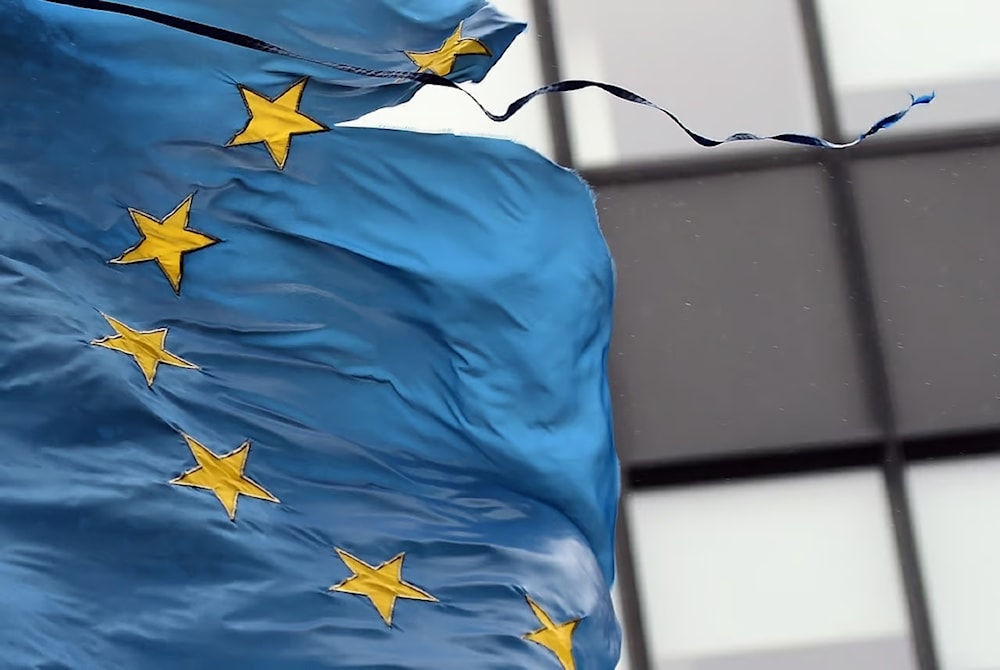Gaza war exposed chaos in EU, declining role, geopolitical influence
A piece published by Modern Diplomacy says that Europe's reaction to the Israeli war on Gaza was not only late but also chaotic.
-

A shredded European Union flag flutters in the wind in Brussels in 2016. (AFP)
The Israeli war on Gaza and the battle with the Palestinian Resistance created divisions within Europe, leaving the continent without clear and effective strategies to address the situation, despite the fact that it will not be able to avoid the war's repercussions, a piece published by Modern Diplomacy argued.
"Europe’s reaction to the conflict was not only delayed but also chaotic," the op-ed said.
The European Union Development Commissioner announced that the EU would end its aid to the Palestinian Authority following the October 7 operation. This decision led to conflict with other EU commissions and criticism from some European politicians.
Moreover, Ursula von der Leyen, the President of the European Commission, made an unexpected visit to "Tel Aviv" shortly after the war started, where she publicly declared the bloc's unwavering support for the occupation entity - but failed to mention the Israeli obligation to adhere to "humanitarian laws" in the ongoing war.
Read more: EU facing credibility crisis amid waning influence in West Asia
While EU leaders reached a consensus on October 15, which considered that Israelis have a "right to self-defense," disunity persisted and Europeans saw themselves as unwilling to "confront" the escalation in the region.
The report said that the EU currently lacks the influence, including over "Israel", and means to help reach and mediate a prisoner exchange deal or ceasefire.
Europeans have limited "influence over the conflict in the Middle East," but are expected to face regional, domestic, and global consequences. This has indicated the decline of Europe's role as a key foreign policy player.
Read more: EU to open sea corridor for Gaza aid amid Palestinian doubt
A domino effect of disasters
The ground offensive on Gaza is likely to increase the risk of higher intervention by Hezbollah and other Resistance groups, potentially expanding the conflict to other parts of the region.
It could also jeopardize the recent de-escalation efforts between Washington and Iran. This, in turn, could intensify public pressure on President Joe Biden to impose stricter sanctions on Tehran's energy sector. Such actions could prompt Iran to "retaliate by accelerating its nuclear program."
The piece argued that the war in Gaza would "have significant implications for global politics," but considered the main question to be how much it would affect the US' policies on Ukraine. And despite claims by US officials that both issues could be handled simultaneously, many analysts argue otherwise, concluding that Washington will be distracted by the situation in the ME and away from Ukraine's developments.
As per the report, Washington needs to allocate more attention and resources not just to the war in Gaza, but also to the broader challenges that may arise or worsen in the Middle East as a result of it. Additionally, the US must maintain its deterrence against China to prevent Beijing from attacking Taipei.
The war also has significant implications for relations among European countries, as the growing number of Palestinians killed by Israelis, which is now close to 32,000 since October 7, is exacerbating divisions both within and between European nations. This could be noticed in Spain and Britain, where Prime Minister Pedro Sanchez and Labor Party leader Kei Starmer are up against challenges within their parties and coalitions.
Read more: European countries protest: 'Stop Israeli crimes on Gaza'
Additionally, Europe's current assumed position of placing most of its support on "Israel" could lead to a wave of terrorist attacks in the continent, while right-wing governments will move to enforce greater control on internal and national borders.
This would come as the war on Gaza might lead to an increased number of refugees heading to Europe, which would increase levels of Islamophobia and anti-immigrant notions in the continent, further leading to stricter right-wing policies.
Turbulent and chaotic
The piece notes "Europe’s weakness and failure are not confined to the recent war in the Middle East."
Europe's failure also included the Azerbaijani-Armenian conflict, where, after years of thinking it was a vital mediator between the two, it became merely a sidelined observer.
Furthermore, migrants continue to cross the Mediterranean from Tunisia, which turned down an EU offer of 60 million euros to address this issue. In Europe, Brussels finds its calls for de-escalation falling on deaf ears in Kosovo and Serbia.
Read more: EU witnessing 'alarming' decline in the rule of law: Report
This passage highlights the contrast between the expectations of European Union (EU) supporters regarding its response to the war in Ukraine and the reality of its geopolitical influence, especially in light of the war in Gaza.
Supporters of the EU hoped that its unified and consistent response to Russia would signal the emergence of a strong geopolitical player in the form of a united Europe. However, the EU's effectiveness in areas such as standardizing electronic devices or agricultural trade does not translate into success in global politics.
"The war in Gaza has revealed the EU as more turbulent and chaotic than ever in its attempts to exert lasting geopolitical influence," the report said.
"The EU's struggles in this regard suggest that it faces significant challenges in translating its economic power and regulatory expertise into effective political action on the global stage," it concluded.
Read more: 'Europeans will never forget': Irish MEP's tearful speech on Gaza

 5 Min Read
5 Min Read











